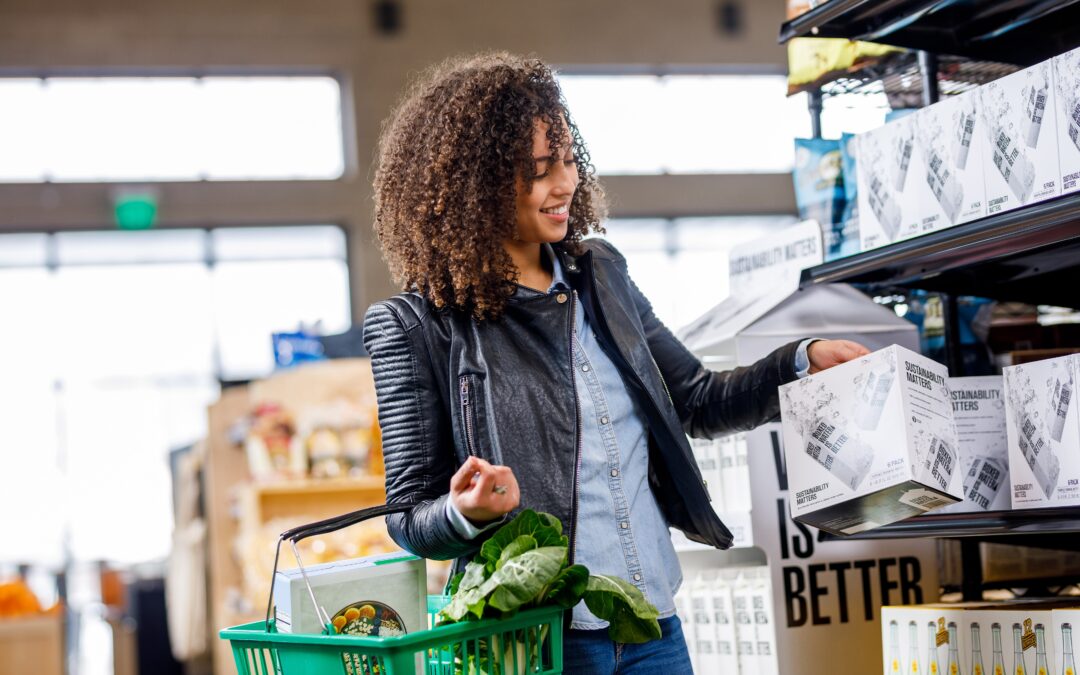You’ve probably heard, the earth is slowly drowning in plastic. Among other environmental crises, plastic pollution is way up and since the vast majority of product manufacturers and retailers don’t seem to be taking notice, it’s up to us to make change if we want to leave our kids a world where they can swim in the ocean without having to paddle through grandpa’s Smart Water bottles and great grandma’s plastic straws.
While the manufacturers that package their products in layers of plastic and other non-reusable, recyclable, or renewable material should 100% start cleaning up their sh!t, we can all do a little better in our daily lives to lessen our negative impact on the environment. If you love the earth, hate climate change, and want to be a good person, here are a few things you can try to ensure your weekly grocery trip doesn’t leave a 1,000+ year impression on our wonderful planet.
Ditch the plastic bags and up your grocery store style game…
It’s always great to get a free reusable shopping bag but if you want to make sure you actually remember to use your reusable bags more often, get ones that you will want to show off.
Whether you’re shopping at your supermarket or farmer’s market, make your shopping trip instantly Instagramable with beautiful French market baskets. Who doesn’t love to give off the “I enjoy wandering the cobblestones streets of Paris in my free time” vibe? These baskets are sturdy, high-capacity, and just plain lovely. You can find many options on Etsy but if you want to be an extra responsible shopper, check out these bags made in Ghana using locally-sourced grasses.
Do you really need a plastic bag for your plastic bag? Leave the produce bags on the roll and let your fruits and veggies breathe!
Why do we use those small plastic produce bags in the first place? To keep our three apples from mingling with our two bell peppers? If you’re opposed to just putting your produce directly in your cart (which is probably not always the best choice, especially for delicate fruits and vegetables), you can start bringing your own reusable produce bags. These options from Amazon are made with organic cotton, are machine washable, durable, and available in a range of sizes to suit whatever produce you want to take home. And when you’re totally finished with them, they biodegrade – unlike those plastic produce bags you use once for like thirty minutes but will stay on earth longer than you, your children, and your grandchildren.
Glass > Plastic
We are probably all aware by now that not only are plastic food containers clogging up our landfills and oceans, but they are also maybe/probably increasing our risk for cancer. Plastic packaging (especially plastic that isn’t BPA-free) seeps chemicals into our food and these “extra” ingredients are super bad for us. While it’s a little harder to find, seek out food products that are packaged in glass containers instead of plastic. Glass recycles, it doesn’t give your food that funky plastic-y aftertaste, and it doesn’t leech any unwanted and dangerous additives to your food. That’s what’s called a win-win-win.
Be a rebel and stop buying your produce at the grocery store…
And buy it from a local farmer instead! If you want to shop truly “local,” look for a CSA (community supported agriculture) group near you. CSAs are run by small, independent farmers who are committed to growing high quality food and leaving a small environmental footprint. By supporting small, family-run farms, you are helping the environment (and local economy) in numerous ways and you are feeding your family the best produce you can get. Local Harvest has a great tool to help you find a CSA near you.
Industrial food producers make it damn near impossible to be earth-conscious consumers and grocery stores do what they can to make it convenient for us to fill up our carts. However, there are ways we can do less environmental damage each time we go to the grocery store. You can fight the power by being a reusable bag trendsetter, resisting the urge of convenience packaging, opting for any packaging that can be recycled or composted, or breaking out of the grocery store game for good. It’s a lot of pressure to try to save the world through what may be one of your least favorite chores. But you don’t have to be perfect. If we all just do a little bit better, saving the world won’t be that hard.
This post is brought to you by Liveli Planner



Recent Comments